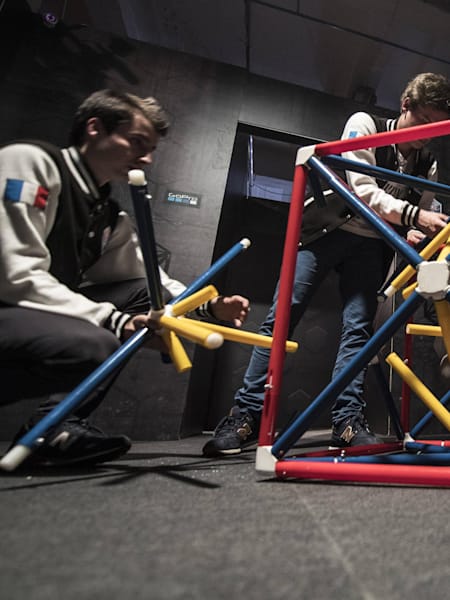Escape Rooms are themed rooms where you and your team have to find clues and solve puzzles to either escape the room or complete a goal within the allotted time (usually 60 minutes). This is an exciting new concept and with the Red Bull Escape Room World Championship adding a competitive aspect to the activity, there’s never been a better time to see what all the fuss is about!
Here are some tips from Leo Dennett of Fox in a Box to help you get started.
1. Choosing an escape room
If you’re lucky, there will be quite a few options available in your town or city. Websites like TripAdvisor or Yelp may give you an idea of some of the most popular escape room companies in your area, and this is a good place to start. Take a look at the various themes and stories, and pick one that sounds interesting or exciting to you. Do you feel like attempting to rob a bank? How about trying to halt the launch of nuclear missiles before time runs out? Maybe escaping the clutches of a serial killer is more your bag! Take into account who might be in your team as certain themes and physical requirements may not be suitable for everyone.
Companies are usually pretty good at listing what is expected of players, and if there are any fear factors. Not all rooms require you to be literally locked inside, and most don’t have horror themes, so don’t let that put you off.
2. Picking your team and making a booking
You’ll ideally want people who know each other well enough to communicate effectively, and who know each other's’ strengths and weaknesses. Diversity is not a bad thing either, as different approaches and mindsets will contribute to a stronger team overall.
Escape room games are a great alternative for team building exercises, and strengthen and improve communication and teamwork skills. They also make for a great social activity between friends and family, and can bridge the gap between young and old!
Some escape rooms take bookings until the room capacity is reached, meaning you may end up playing with strangers if you do not book all available slots. Other escape room companies will give you the entire room as a private booking. It’s important to check this when you are booking to avoid potential disappointment. Playing with strangers is not always as bad as its sounds, but for your first time it’s probably preferable to stick with people you know!
When playing for the first time it doesn’t hurt to have more people in your team. But you will probably find that the more you play, the more you want to see everything yourself. A large team runs the risk of meaning you do not get to solve or participate as much as you’d like. After a couple of games under your belt, it might be worth calling an escape room to get their advice on optimal team sizes for specific rooms of theirs if you’re not sure.
3. On the day
When playing an escape room, it is likely that you will need to crouch and look under things, and possibly even crawl on the floor at times. Wearing comfortable, stretchy clothes is a sensible option. I recommend meeting with your teammates beforehand at a location close to the escape room, ideally at a coffee shop or bar that is walking distance. This is also the time to come up with a game plan! Math skills, a steady hand, knowledge of Morse code; make known any hidden talents that may be useful in a puzzling situation.
I recommend having something to eat, and a caffeinated drink prior to playing to make sure you are in peak mental and physical condition. Solving puzzles and working against the clock is more tiring than you think, and you’ll want to be as focused as possible for the entire experience. With that in mind, I strongly discourage drinking alcohol prior to escape rooms. It will diminish your performance and increase the chance of breaking something and frustrating your team!
Meeting up before your escape room minimises the chances of arriving to your experience late which will not benefit you or your hosts. Generally speaking most locations will prefer it if you arrive 15 minutes before the scheduled start time. Your host (game master) will love you for being on-time and prepared. A good game master can make or break your experience, so it won’t hurt to start off on a good foot.
4. Getting your introduction
Prior to your game, you will normally receive an introduction of what to expect, and any rules. Pay close attention! Every escape room company is different, and rules may change even on a room-by-room basis within a particular company.
The rules are there to help you maximise your time. Don’t waste it trying to climb on things or using items more than once if you have been told otherwise. You’ll also be advised as to what system there is for hints. Hint systems vary from using walkie-talkies, reading text from a monitor, or receiving visual clues.
After a general introduction, you will find out the backstory to your room, normally either from your game master or a video. Immersion is an important part of the experience, so whether you’re breaking out of jail, or curing a zombie virus, let yourself escape from reality and assume the role that lies before you.
5. Let the games begin!
When the timer starts, split up and search the room thoroughly. Say out loud what you see when something looks puzzle-related, and whenever you find or unlock something of interest. Sharing this information is important when it comes to making connections between clues. For example, a symbol spotted under a desk might be crucial later on, but if you don’t let your team know you’ve seen it then they won’t have the chance to use it! Communication is paramount. Even thinking out aloud can help trigger new ideas in your teammates.
It is likely that at some point you will get stuck and require a nudge in the right direction. Don’t let pride get the better of you, there is no shame in asking for hints! You’ll have a more enjoyable time if you progress consistently through the room and see most of the puzzles even if you don’t quite make it out in time. Sometimes it can be hard to get started when there is so much to take in. Don’t wait longer than five or 10 minutes to ask for your first hint to get the ball rolling, because you might never make that time back if you burn up any more valuable minutes with no progress.
When you find important props and puzzles, it can help to keep them all in one place so your team can easily inspect or retrieve them when necessary. A good room won’t let you ‘break’ a puzzle by disturbing prop locations, but bear in mind that the proximity of some items may be deliberate in a way that will make the puzzle easier to understand. Exercise caution if something looks meticulously set up.
Rooms are rarely 100% linear, so whilst it can be tempting to follow the action, 5 people watching someone complete a maze to retrieve a key is not the best use of time. Try to find your own avenue of exploration and work on props and areas that the rest of your team is not. If you are working on a puzzle, especially a physical one, and are having difficulty, don’t be afraid to get a teammate to take over. Different approaches to problem-solving is key to succeeding. Also, nobody likes a puzzle-hog! Admit defeat and act in the best interests of the team.
Calling out what you see and thinking out loud can help your teammates
© Mihai Stetcu | Red Bull Content Pool
Puzzles in an escape room should be fair and logical. Thinking outside the box will be required at times, but start with basic solutions and a rational approach to problem-solving. Do not start throwing random numbers and codes in locks. Not only is this a waste of time, but you run the risk of unknowingly accessing a location that was not meant for you until further into the game. The same goes for bypassing locks and puzzles with force. It will only disrupt the flow of your game and create confusion. Escape rooms will rarely require physical strength of any kind. Be respectful of your surroundings and don’t ruin the experience for your team or for those that will play next.
Keep used keys in their locks, and opened locks on their latches. This prevents confusion over what keys have and haven’t been used, and what words/codes were the correct solution. Especially in a bigger room, it helps for there to be something of a trail that your fellow teammates can reference if they were busy elsewhere.
‘Do Not Touch’ does not always mean ‘Do Not Look’! Whilst some room elements like plug sockets are not part of the game and should be ignored, props and other locations may be marked ‘Do Not Touch’ yet still contain important visible information.
If your game master says stop, then stop! They are there to help you and preserve your experience. If you feel like something permanent is necessary but you’re not too sure (e.g cutting a wire) then state aloud what you are about to do. Give a game master a few seconds to interject if you are about to cause some damage! Better to be safe than sorry, and they will thank you for it! If a game master suggests it’s time for a hint, then it probably means you are not on the right track and you are losing time, so take their advice and request one.
The competitive side of us may wish to take no hints and attempt to beat the fastest time, but really the point of an escape room is to have fun and enjoy yourself.
Keep an eye on the clock so that you remember to ask for hints if you stall; games are rarely won by kicking it into overdrive just for the last five minutes. Don’t worry about getting the fastest time, unless you are competing in the Red Bull Escape Room World Championship, of course!
6. After the game
When the game is over your host will congratulate/commiserate and should be able to answer any questions about the puzzles and any steps that may remain. A good game master will try to ensure you see the majority of the room during your experience. Generally, escape rooms are not ordinarily worth replaying to complete, and your money is better spent on a new room the next time. Ordinarily a team photo opportunity follows, and then depending on the facilities you may get a chance to take a seat and have a coffee. Your team will likely be excited to talk about the experience, but always be careful not to spoil the rooms and puzzles when around other customers; it’s not the polite thing to do.
Debriefing together after your escape room is recommended as you can catch up on some of the puzzles and solutions you may have missed whilst working on different parts of the room. Discuss your failures and successes, and maybe even which room to play next.
Finally, if you have a positive experience, then consider leaving an online review for other people to know just how much fun you had. This will help the escape room industry grow, allowing for a steady stream of new rooms to arrive in your area, and potentially improving the scale and production of the experiences available to you.








